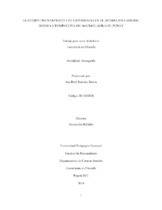El cuerpo tecnológico y su experiencia en el mundo, una mirada desde la perspectiva de Maurice Merleau-Ponty.
Citación
Fecha
2018Autor
Ramírez Rivera, Ana Ruth
Director / Asesor / Tutor
Ballabio, Alessandro
Metadatos
Mostrar el registro completo del ítemResumen
Con base en el pensamiento de Maurice Merleau-Ponty se intenta, en primer lugar, hacer un análisis del cuerpo desde una postura fenomenológica más allá de todo pensamiento objetivo que lo aleje de su experiencia del mundo, y de la posibilidad del cuerpo mismo de incorporar la tecnología y transformarla en expresión de su propio modo de ser. En este sentido, el proceso de tecnologización del cuerpo propio como apertura, como ―yo puedo‖ o activa trascendencia del mundo y en el mundo, como principio constitutivo de la experiencia con su capacidad de habituarse y como conciencia encarnada, representa el punto cero o la condición de posibilidad de existencia y cognoscibilidad de un mundo asimismo tecnologizado. En un segundo momento, se pretende sustentar que a medida que hacemos un redescubrimiento de nuestro cuerpo vivido, éste no es sólo en esencia tecnológico en el sentido de que gracias a su plasticidad puede incorporar y vivir la tecnología como en el caso de las prótesis, sino que éstas, más que sustituir o reemplazar un miembro o función, pasan a unirse y a entremezclarse con él, incluso llevándolo más allá de sus propios límites. Cuando el cuerpo se tecnologiza se vuelve aquel lugar donde es posible constituir estructuras que pueden ir más allá de las capacidades biológicas que se conocen, mostrándonos también cómo la tecnociencia (los avances en biónica, por ejemplo) de algún modo permiten redescubrir nuestro cuerpo como vivido. Finalmente se expone la experiencia de hacer una entrevista fenomenológica a una persona que por motivos de enfermedad perdió parte de sus extremidades inferiores y ahora ha incorporado a/en su cuerpo prótesis transtibiales. Con este ejercicio se pretende no solo hablar de la fenomenología del cuerpo sino también de hacerla para poderla comprender de manera práctica, recogiendo y de alguna manera también viviendo las descripciones que dio la persona durante el encuentro y relacionándola con el contenido de los primeros dos capítulos. Aquí podremos apreciar las descripciones dadas por la persona entrevistada, las observaciones y la manera en que también su experiencia causó en mi reflexión un efecto formativo y afectivo.
Abstract
Based on the thought of Maurice Merleau-Ponty, an attempt is made, in the first place, to make an analysis of the body from a phenomenological stance beyond any objective thought that moves it away from its experience of the world, and from the possibility of the body itself to incorporate technology and transform it into an expression of their own way of being. In this sense, the process of technologization of one's own body as an opening, as "I can" or active transcendence of the world and in the world, as a constitutive principle of experience with its capacity to become habituated and as embodied consciousness, represents the zero point or the condition of possibility of existence and knowability of a world that is also technological. In a second moment, it is intended to sustain that as we make a rediscovery of our lived body, this is not only in essence technological in the sense that thanks to its plasticity It can incorporate and live the technology as in the case of prosthetics, but that these, rather than substituting or replacing a member or function, come to join and intermingle with it even taking it beyond its own limits. When the body becomes technological it becomes that place where it is possible to constitute structures that can go beyond the biological capacities that are known, showing us also how technoscience (advances in bionics, for example) somehow allows us to rediscover our body as lived. Finally, it is set forth the experience of making a phenomenological interview to a person who, due to illness, lost part of his lower extremities and has now incorporated transtibial prostheses into his/her body. This exercise is intended not only to talk about the phenomenology of the body but also to do it in order to understand it in a practical way, collecting and in some way also living the descriptions that the person gave during the meeting and relating it to the content of the first two chapters. Here we can appreciate the descriptions given by the interviewed person, the observations and the way in which his experience also caused a formative and affective effect in my reflection.
Editorial
Universidad Pedagógica Nacional
Programa académico
Licenciatura en Filosofía

